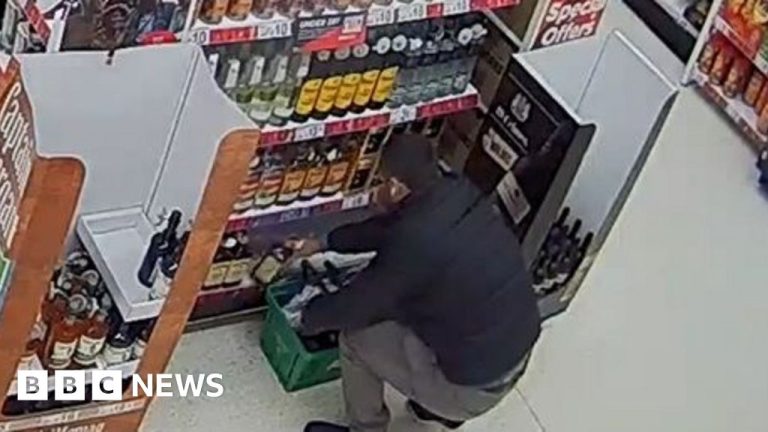BBC
The tactics of an increasingly professional shoplifting gang who stole at least £73,000 worth of goods from supermarkets across the UK have been revealed to the BBC.
Typically operating in groups of three, gang members wear Bluetooth headsets to communicate and alert each other if security officers are watching them.
Rolling a shopping cart or carrying a supermarket basket, they blend in with shoppers strolling down the liquor aisle, nonchalantly pulling bottles of champagne from the shelves.
Then one gang member will deliberately trigger the security alarm to distract staff, while another simply walks out of the store with their stolen goods.
“It’s like a mafia-type operation. It’s run like a business,” says Sarah Bird of National Business Crime Solution (NBCS), an organization that works with 100 businesses to combat retail crime.
The criminals were nicknamed “the champagne gang” by the organization, as this was the main item they focused on stealing.
The gang “took full advantage” of a champagne shortage in continental Europe 18 months ago, says Ms Bird, brought on by a post-Covid surge in demand and the failure of some crops. That meant a stronger black market, she said.
The group has a clear hierarchy with people at the top who instruct, she said, and a stream of employees who get paid.
“They go to a specific location, they have a list of things to steal. They steal the goods and receive a daily rate,” says Ms Bird, local services manager at NBCS.
NBCS
Police believe stolen goods are often transported to Europe
The sophisticated shoplifting operation run by the Champagne gang is being replicated by other criminal groups across the country.
The NBCS claims to be tracking 63 organized crime groups across the UK who have stolen at least £2.4 million worth of goods over five years. Of these, 26 groups are from the United Kingdom and Ireland, with the rest mainly from Eastern European countries.
The champagne gang hail from Romania and are responsible for 60 shoplifting incidents across the UK – from Gateshead to Bournemouth – according to NBCS data.
They appeared on NBCS's radar in early 2023, but have since started appropriating other types of alcohol and meat to meet new demand.
The group changes tactics when new technologies come to market that could impact how it operates.
“Initially they used trolleys to take goods out of stores,” Ms Bird says. “However, retailers have invested in cart wheel technology to stop carts at certain locations in stores.
“So they started using baskets and bags to remove the goods.”
NBCS's Sarah Bird says only two members of the group have been prosecuted so far
While the gang usually operate in groups of three, during one robbery in Harrogate, North Yorkshire, there were at least seven members in the store.
“We believe they took the opportunity at the Harrogate store to provide a day of training for new recruits, showing them the ropes and then putting them to work,” says Ms Bird.
“If they are caught, they are disposable. Generally speaking, if they are arrested and charged, they will be released on bail and, very often, they will return to their country, in this case to Romania.”
Only two members of the group have been prosecuted so far, according to NBCS.
It's not just thieves who end up in Romania: it's believed that stolen goods end up there too, she says.
Intelligence, including from ANPR (automatic number plate recognition) cameras, suggests the gang's vehicles are heading to Europe with the goods inside.
“This makes for an efficient supply chain. Goods are transported from the United Kingdom to the continent to be sold in particular in Romania.
Sarah Walker says gangs entering her store intimidate staff
Retailers have repeatedly warned that shoplifting gangs are helping fuel rising retail crime – and it's hitting shoppers deep in their pockets.
Shoplifting added £133 to the average annual cost of a British family, according to the Center for Retail Research.
Browns department store in Beverley, East Yorkshire, is the target of increasingly clever gangs, says its manager, Sarah Walker.
In March, a gang stole perfume from his store and, within 90 minutes, had targeted another Browns store, 30 miles away in York.
“They've researched the market they're going to, they've looked at the stores that carry the products they need. It’s calculated,” Ms. Walker said.
Staff observe gangs of four to six people of both sexes entering the store, knowing exactly what to target.
“These gangs are intimidating, they can be young, and it's difficult to subject my staff to that vulnerability,” says Ms Walker.
“You don’t expect to come to work and be pushed around for someone who has a shopping list – that’s organized crime and it’s a huge blow to our business.”
Ms Walker says she reports incidents of shoplifting to the police, but it “often falls on deaf ears” and no one is arrested.
She wants to see more information sharing between British police forces.
Steph Coombes, head of intelligence at NPCC's Opal unit, says initiative to tackle shoplifting has had positive results
Humberside Police said they had made contact with North Yorkshire Police and the force believed the two incidents in Beverley and York were linked.
However, he said the suspects could not be identified from the CCTV footage and hence no arrests could be made.
The last year has seen more information sharing between forces, in the form of Project Pegasus, within the National Police Chiefs' Council (NPCC), which focuses on serious organized shoplifting .
Shoplifting gangs are “very good at adapting” their methods, Steph Coombes, of the NPCC, told the BBC.
A total of 60 arrests were made as part of the operation in four months, impacting organized crime groups and individuals, representing £3.4 billion in losses, she added.

